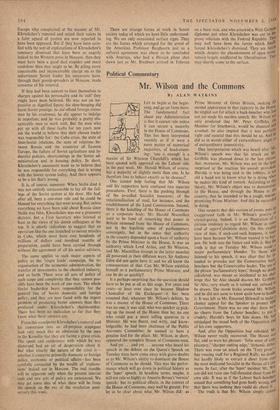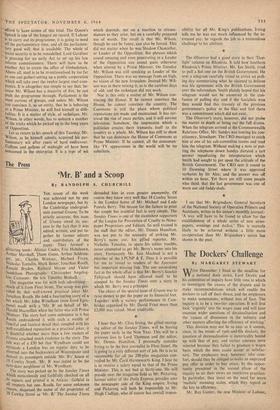Political Commentary
Mr. Wilson and the Commons
By ALAN WATKINS
One cannot help feeling that Mr. Wilson and his supporters have confused two separate procedures. First, there is the pushing through of the so-called Socialist measures; of the renationalisation of steel, for instance, and the establishment of the Land Commission. Second, there is the handling of the House of Commons as a corporate body. Mr. Harold Macmillan used to be fond of remarking that power in Britain stemmed from the House of Commons, not in the legalistic sense of parliamentary sovereignty, but in the sense that authority in the country depended upon a basis of authority by the Prime Minister in the House. It was an authority which Lord Attlee, and Sir Winston, and Mr. Macmillan (except in the latter months) all possessed in their different ways. Sir Anthony Eden did not quite have it; and we all know the consequences of that. Can Mr. Wilson establish himself as a parliamentary Prime Minister, and can he do so quickly?
It is perhaps surprising that the question should have to be put at all at this stage. For years and years—at least ever since he became Shadow Chancellor of the Exchequer—it has been assumed that, whatever Mr. Wilson's defects, he was a master of the House of Commons. There was no one, it was said, who was quicker at pick- ing up the mood of the House than he; no one who could put a more telling question to a Minister. He was fluent, and witty, and know- ledgeable; he had been chairman of the Public Accounts Committee; he seemed to have a genuine feel for the place. Mr. Wilson, in short, appeared the complete House of Commons man.
And yet ... and yet ... anyone who heard his speech in the debate on the Queen's Speech on Tuesday must have come away with grave doubts as to Mr. Wilson's ability to dominate the House of Commons as he should. This was the perfor- mance which will go down in political history as the 'leper' speech. In headline terms, maybe, it will not rate so highly as Aneurin Bevan's 'vermin' speech: but its political effects, in the context of the House of Commons, may well be greater. For let us be clear about what Mr. Wilson did: as
Prime Minister of Great Britain, making hit second appearance in that capacity in the House,' he singled out for attack a back-bencher who Nu not ,yet made his maiden speech. Mr. Wilson Ilut only predicted that Mr. Peter Griffiths, Ill Member for Smethwick, would be shunned alr avoided; he also implied that it was perfect right and natural that this should be so. And he did so in words either of extraordinary anger or of extraordinary insensitivity. One interpretation which was heard after Mr' Wilson's speech was that his attack on Mc' Griffiths was planned down to the last phrase; that, moreover, Mr. Wilson was not in the leas,t surprised at the reaction his assault provoke°. Harold. it was being said in the lobbies, is to° old a hand not to know what he is doing when he makes this kind of remark. AcCording to this theory, Mr. Wilson's object was to demonstrate to the House, and through the House to the country, that he intended to be a tough, unconi; promising Prime Minister. And this he succeedo in doing. One suspects that this version of events puts tut, exaggerated faith 'in Mr. Wilson's powers 01 crystal-gazing. Indeed, it is an illustration of a curious tendency to regard Mr. Wilson as sante, kind of super-Calvinistic deity. On this exalteut view of him, if such-and-such happens, it otos have been because Mr. Wilson wanted it to hal). pen. He both sees the future and wills it. But the truth is that on Tuesday Mr. Wilson made major parliamentary blunder. To those 4° listened to his speech, it was clear that he lir tended to provoke not the Conservative bad': benchers but the Conservative leader. The use 01 the phrase 'parliamentary leper,' though no douhii calculated, was meant as incidental to his char lenge that Sir Alec should disown Mr. Griffiths. Sir Alec, very wisely as it turned out, refused ter be drawn. The storm broke around Mr. Wilson, and he did not seem to know quite how.to handle it. It was left to Mr. Emanuel Shinwell to make clumsy appeal for the Speaker to protect 14h Government. There was no one else; there Ore, no cheers from the Labour benches; to put crudely, Harold's boys let him down. He misjudged the mood both of the Opposition uni. of his own supporters. And, after the Opposition had subsided, Mr' Wilson never really recovered. The House W11' flat, and so were his phrases: 'false sense of coal; placency,"sharper cutting edge,' dynamic drive. There was even an attack on the `Tory press'-' fine rousing stuff for a Regional Rally, no doubt. but hardly likely to extract a cheer from even the most dedicated Socialist in the House of Cour mons. In fact, after the 'leper' incident Mr. NO!' son did not raise one full-throated cheer from his own side. It was as if the Labour back-benchersi sensed that something had gone badly wrong, lulu that there was nothing they could do about it. ,
The truth is that Mr. Wilson simply cant
afford to have scenes of this kind. The Queen's Speech is one of the longest on record. If Labour IS to carry out its programme, it is going to need all the parliamentary time, and all the parliamen- tary good will, that is available. The whole of social security is to be remodelled. Lord Gardiner IS pressing for an early Act to set up 'his law reform commissioners. There will have to -be another Act to create the office of Ombudsman. Above all, steel is to be re-nationalised by (so far as one can gather) setting up a public corporation Which will take over the twelve largest steel corn- Panies. It is altogether too simple to say that, be- cause Mr. Wilson has a majority of five, he can Push the programme through. Parliament is the most curious of groups, and unless Mr. Wilson can convince it, as an entity, that he is behaving as a Prime Minister, he will find himself in diffi- culties. It is a matter of style, of technique. Mr. Wilson, in other words, has to unlearn a number Of the tricks which he picked up in the long years of Opposition.
Let us return to his speech of this Tuesday. Mr. Wilson, as he himself admits, acquired his par- liamentary wit after years of hard endeavour. Gallons and gallons of midnight oil have been consumed in the enterprise. It is a type of wit which depends, not on a reaction to circum- stances as they arise, but on a carefully prepared use of words. The result is that Mr. Wilson, though he can be funny, can also be forced. This did not matter when he was Shadow Chancellor, or Leader of the Opposition. But phrases which sound amusing and even penetrating in a Leader of the Opposition can sound quite otherwise when uttered by a Prime Minister. On Tuesday Mr. Wilson was still speaking as Leader of the Opposition. There was no message from on high, no vision of the new Jerusalem. Instead Mr. Wil- son was in there mixing it, as in the carefree days of old; and the technique did not work.
Nor is this only a matter of Mr. Wilson con- vincing the House., If he cannot convince the House, he cannot convince the country. The Commons is still the place where political reputations are made and maintained. It has sur- vived the rise of mass parties, and it will survive television. Somehow, the impression which a politician creates there transmits itself to the country as a whole. Mr. Wilson has still to show that he can dominate the House of Commons as Prime Minister. If he cannot, all the statesman- like TV appearances in the world will be no substitute.

































 Previous page
Previous page